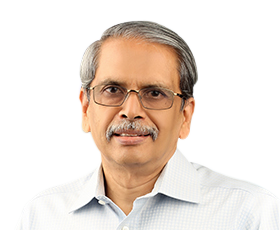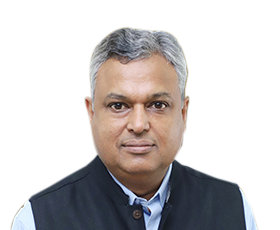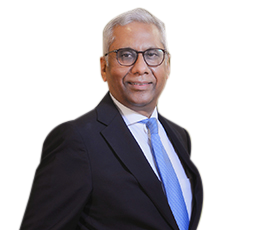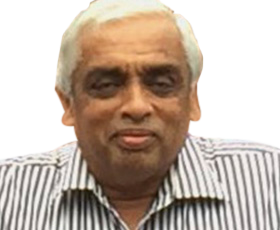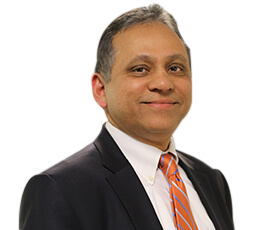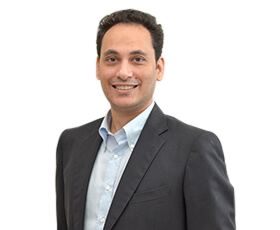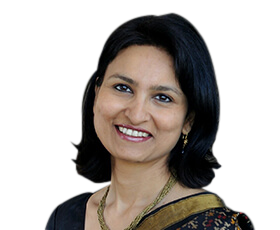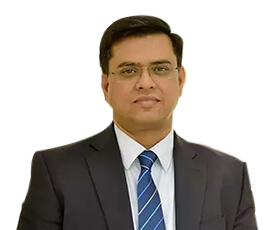
Mr Senapathy “Kris” Gopalakrishnan is the Chairman of Axilor Ventures, an accelerator that helps start-ups during the early stage of their business journey. Kris served as the vice chairman of Infosys from 2011 to 2014 and the chief executive officer and managing director of Infosys from 2007 to 2011. Kris is one of the co-founders of Infosys. Recognized as a global business and technology thought leader, he was voted the top CEO (IT Services category) in Institutional Investor's inaugural ranking of Asia's Top Executives and selected as one of the winners of the second Asian Corporate Director Recognition Awards by Corporate Governance Asia in 2011. He also was selected to Thinkers 50, an elite list of global business thinkers, in 2009. He was elected president of India's apex industry chamber Confederation of Indian Industry (CII) for 2013-14, and served as one of the co-chairs of the World Economic Forum in Davos in January 2014.
In January 2011, the Government of India awarded Mr. Gopalakrishnan the Padma Bhushan, the country’s third-highest civilian honor.
Mr Gopalakrishnan serves on the Board of Governors of Okinawa Institute of Science and Technology (OIST) and is the Chairman, Board of Governors of IIIT, Bangalore. He is the Chairman of the Vision Group on Information Technology of Karnataka Government and the Chairman of CII Digital Council.
Mr Gopalakrishnan is the chairman of Itihaasa Research and Digital which publishes history of Indian IT industry as “itihaasa” (www.itihaasa.com) app as well as reports on industrial and academic research in India.
Mr Gopalakrishnan invests in promoting research on Brain sciences, aging related disorders as well as investing in start-ups and start-up ecosystem.
Mr. Gopalakrishnan holds Master’s degrees in physics and computer science from the Indian Institute of Technology, Madras. Kris is a Fellow of Indian National Academy of Engineers (INAE) and an Honorary Fellow of Institution of Electronics and Telecommunication Engineers (IETE) of India.

Dr. Saurabh Garg is the Chief Executive Officer of Unique Identification Authority of India. Prior to this he was Principal Secretary, Agriculture and Farmers' Empowerment, Odisha where he worked on digitalizing agriculture and developing a direct income transfer scheme for farmers. He has worked in the Ministry of Finance, Government of India, where he spearheaded the formation of the National Investment and Infrastructure Fund (NIIF); worked on improving the Foreign Direct Investment (FDI) policies; preparing the initial framework for digital payments; revamping of the gold sector policies and led the negotiations for the Bilateral Investment Treaties (BITs). He has been a member of Expert Committees / Working Groups set up by the Ministry of Finance, Niti Aayog, RBI and SEBI on 'Social Stock Exchanges'; 'Integration of Commodities Spot and Derivatives Markets'; 'Promotion of Digital Payments'; and 'Framework regarding Virtual / Crypto Currencies'. He has also worked in the areas of developing urban and industrial infrastructure.
Dr. Garg is an IAS officer of Odisha Cadre and has over 30 years of experience at different levels of Government - District, State and the Central Government as well as in the Private Sector. He has also worked as Adviser with the World Bank in the office of the Executive Director for India in Washington DC. He has been the Chairman / Managing Director of Public Sector Companies.
Dr. Garg holds a Ph.D. in International Economics and Development from the Johns Hopkins University, USA. He has an MBA from the Indian Institute of Management, Ahmedabad, where he was awarded a Gold Medal, and a B.Tech. from the Indian Institute of Technology, New Delhi. He was a Gurukul Chevening Fellow at the London School of Economics & Political Science, London.
He has published articles and contributed to books in different areas including innovations in administration, infrastructure financing and financial inclusion.

Deepak Bagla has a professional career of over three decades, with the World Bank, Citibank, and Private Equity having responsibilities across Europe, Africa and Asia.
He is currently the Managing Director and CEO of Invest India, the National Investment Promotion and Facilitation Agency promoted by the Government of India. Invest India is also the execution agency for Start-up India and the Prime Minister’s Science and Technology initiative.
He is a member of several High-level Government committees including Fintech, Innovation, and Infrastructure. Mr. Bagla is on the Advisory Board of the Government $7 billion “Fund of Funds for MSMEs” and the Investment Committee for the Government US $ 1.5 billion “Fund of Funds for Start-ups”.
Mr Bagla has a bachelor’s degree with Honors in Economics from St Stephens College, New Delhi and a dual Masters in International Diplomacy and International Trade and Finance from The School of Foreign Service, Georgetown University, Washington DC.

I am working on market-based financing solutions for poor households, small businesses, and poor countries. I continue to work toward developing a low-cost remittance platform originally proposed in my TED Talk.
Related work includes diaspora bonds as a financing instrument for companies and countries; remittance-linked structured loans, bonds and insurance products; and harnessing diaspora philanthropy. Relevant innovative financing tools include shadow sovereign ratings for unrated countries and future-flow securitization (of payment rights and other future flows) to access capital markets.
In 2012, I founded KNOMAD, a global knowledge hub on migration, and in 2010, co-founded Migrating out of Poverty Research Consortium with its HQ at the University of Sussex. Around the same time, I also came up with the idea of (and raised funds to incubate) the Africa Institute for Remittances. I serve as focal point on migration, remittances and diaspora bonds for the World Bank, and a co-coordinator of the (G7/G20) Global Remittances Working Group.
During 2010-2016, I participated in the World Economic Forum council on migration. In 2015 I was affiliated with South Asia Institute, Harvard University as a Senior Visiting Fellow, and during 2011-13, with University of Sussex as a Visitor Professor of Economics. I was a member of the first advisory committee of the Migration Policy Center of European University Institute, Florence.

Gopalaraman Padmanabhan, (DB: 29/05/1955) a post graduate in Economics from Kerala University and a Masters in Business Administration from the Birmingham Business School holds extensive experience and expertise in bank regulation and supervision, development of foreign exchange/securities markets in India, information technology and payment systems, with more than 35 years of experience with the RBI in various capacities i.e. recommending and implementing policies, systems, guidelines and regulations relating to the banking, financial services and securities sector of the country.
Padmanabhan was the Chairman of the Committee to implement GIRO in the country and has been involved in the implementation of new e-Treasury system in the Reserve Bank. He was also involved in the operationalisation of the first of its kind ISO 20022 standards based RTGS System and the digitisation of payment transactions.
Padmanabhan was also the Chairman of the Technical Committee on Services/Facilities for Exporters and a part of the think tank to manage market volatility, as well as a member of the Governing Council of the Institute for Development & Research in Banking Technology, a banking research institute established by RBI. He represented RBI in the Committee on Payment and Settlement Systems, Basel and was also inducted into the Steering Group of the CPSS-IOSCO for Review of Standards.
As a member of the Working Group of the CPSS, Basel, Padmanabhan worked on the report on Principles for Financial Market Infrastructures and also chaired the International Working Group set up by CPSS(now CPMI) on Non-banks. He was one of the persons responsible for drafting the Sodhani Committee's report in 1995 on the foreign exchange market and measures for widening and deepening the market, and has supervised the revision of the Internal Control Guidelines for Foreign Exchange Business in 1996. Padmanabhan was also a member of the internal group that prepared and submitted a Technical Paper on Asset -Liability Management for Indian banks which was accepted by the Bank and formed the basis for Reserve Bank of India's initiative.
On superannuating while holding position of Executive Director from the RBI, Padmanabhan was appointed as Non-Executive Chairman of Bank of India in Aug 2015. He held this position for 5 years till Aug 2020. Padmanabhan advises several firms on banking/ foreign exchange and payment system and other regulatory issues. He also holds Board positions in Axis Bank, Aditya Birla Sunlife AMC Trustee Board and in Haldyn Glass.

Gopalaraman Padmanabhan, (DB: 29/05/1955) a post graduate in Economics from Kerala University and a Masters in Business Administration from the Birmingham Business School holds extensive experience and expertise in bank regulation and supervision, development of foreign exchange/securities markets in India, information technology and payment systems, with more than 35 years of experience with the RBI in various capacities i.e. recommending and implementing policies, systems, guidelines and regulations relating to the banking, financial services and securities sector of the country.
Padmanabhan was the Chairman of the Committee to implement GIRO in the country and has been involved in the implementation of new e-Treasury system in the Reserve Bank. He was also involved in the operationalisation of the first of its kind ISO 20022 standards based RTGS System and the digitisation of payment transactions.
Padmanabhan was also the Chairman of the Technical Committee on Services/Facilities for Exporters and a part of the think tank to manage market volatility, as well as a member of the Governing Council of the Institute for Development & Research in Banking Technology, a banking research institute established by RBI. He represented RBI in the Committee on Payment and Settlement Systems, Basel and was also inducted into the Steering Group of the CPSS-IOSCO for Review of Standards.
As a member of the Working Group of the CPSS, Basel, Padmanabhan worked on the report on Principles for Financial Market Infrastructures and also chaired the International Working Group set up by CPSS(now CPMI) on Non-banks. He was one of the persons responsible for drafting the Sodhani Committee's report in 1995 on the foreign exchange market and measures for widening and deepening the market, and has supervised the revision of the Internal Control Guidelines for Foreign Exchange Business in 1996. Padmanabhan was also a member of the internal group that prepared and submitted a Technical Paper on Asset -Liability Management for Indian banks which was accepted by the Bank and formed the basis for Reserve Bank of India's initiative.
On superannuating while holding position of Executive Director from the RBI, Padmanabhan was appointed as Non-Executive Chairman of Bank of India in Aug 2015. He held this position for 5 years till Aug 2020. Padmanabhan advises several firms on banking/ foreign exchange and payment system and other regulatory issues. He also holds Board positions in Axis Bank, Aditya Birla Sunlife AMC Trustee Board and in Haldyn Glass.

National Payments Corporation of India (NPCI) was incorporated in 2008 as an umbrella organization for operating retail payments and settlement systems in India. NPCI has created a robust payment and settlement infrastructure in the country. It has changed the way payments are made in India through a bouquet of retail payment products such as RuPay card, Immediate Payment Service (IMPS), Unified Payments Interface (UPI), Bharat Interface for Money (BHIM), BHIM Aadhaar, National Electronic Toll Collection (NETC Fastag) and Bharat BillPay. NPCI also launched UPI 2.0 to offer more secure and comprehensive services to consumers and merchants.
NPCI is focused on bringing innovations in the retail payment systems through use of technology and is relentlessly working to transform India into a digital economy. It is facilitating secure payments solutions with nationwide accessibility at minimal cost in furtherance of India’s aspiration to be a fully digital society.
For more information, visit: https://www.npci.org.in/

Payments Council of India was formed in the year 2013 catering to the needs of the digital payment industry. The Council was formed inter-alia for the purposes of representing the various regulated non-banking payment industry players, to address and help resolve various industry-level issues and barriers which require discussion and action. The council works with all its members to promote payments industry growth and to support our national goal of ‘Cash to Less Cash Society’ and ‘Growth of Financial Inclusion’ which is also the Vision Shared by the RBI and the Government of India. PCI works closely with the regulators i.e. Reserve Bank of India (RBI), Finance Ministry, and any similar government, departments, bodies, or institutions to make ‘India a less cash society.
For more information, visit: http://paymentscouncil.in/

Fintech Convergence Council (FCC) after successfully hosting the largest Virtual Fintech Conference - Global Fintech Fest in the month of July 2020, and partnered with the Monetary Authority of Singapore (MAS) as Global Satellite Event Partner for Singapore Fintech Festival (SFF)2020 to host the India leg of Singapore Fintech Festival (SFF). The India Leg of Singapore Fintech Fest (SFF) was organized by FCC and UNCDF jointly.
Fintech Convergence Council (FCC) represents the Fintech industry and traditional companies in the BFSI space. The purpose of the council is to encourage collaboration, seek complementarities and build synergy between leading BFSI companies and the emerging Fintech start-ups. The council has worked towards interpreting the regulatory and legal framework, aggregating the concerns and feedback of the various players within the larger Fintech community, communicating it to regulators and lawmakers, and organizing events and gatherings for the industry participants to meet, share ideas and work together in the interest of creating a safer, more open and more collaborative operating environment through a transparent forum. The vision of the council is to “To proactively work towards growth of Fintech and penetration of financial services to support our national goal of financial inclusion, moving towards a digitally empowered country.”
It has been the endeavor of FCC to showcase India's Fintech landscape to the world, and no better platform than the Singapore Fintech Festival. The agenda brought together who from the Indian Financial space over the 5 day event. The line up of events also included a curated session matching Indian start-ups with global investors. The Deal Friday platform provided a unique opportunity to early-stage Fintech start-ups from India to pitch and have one on one meetings with a broad spectrum of investors looking for investment opportunities in India.
For more information, visit: https://www.fintechcouncil.in/

